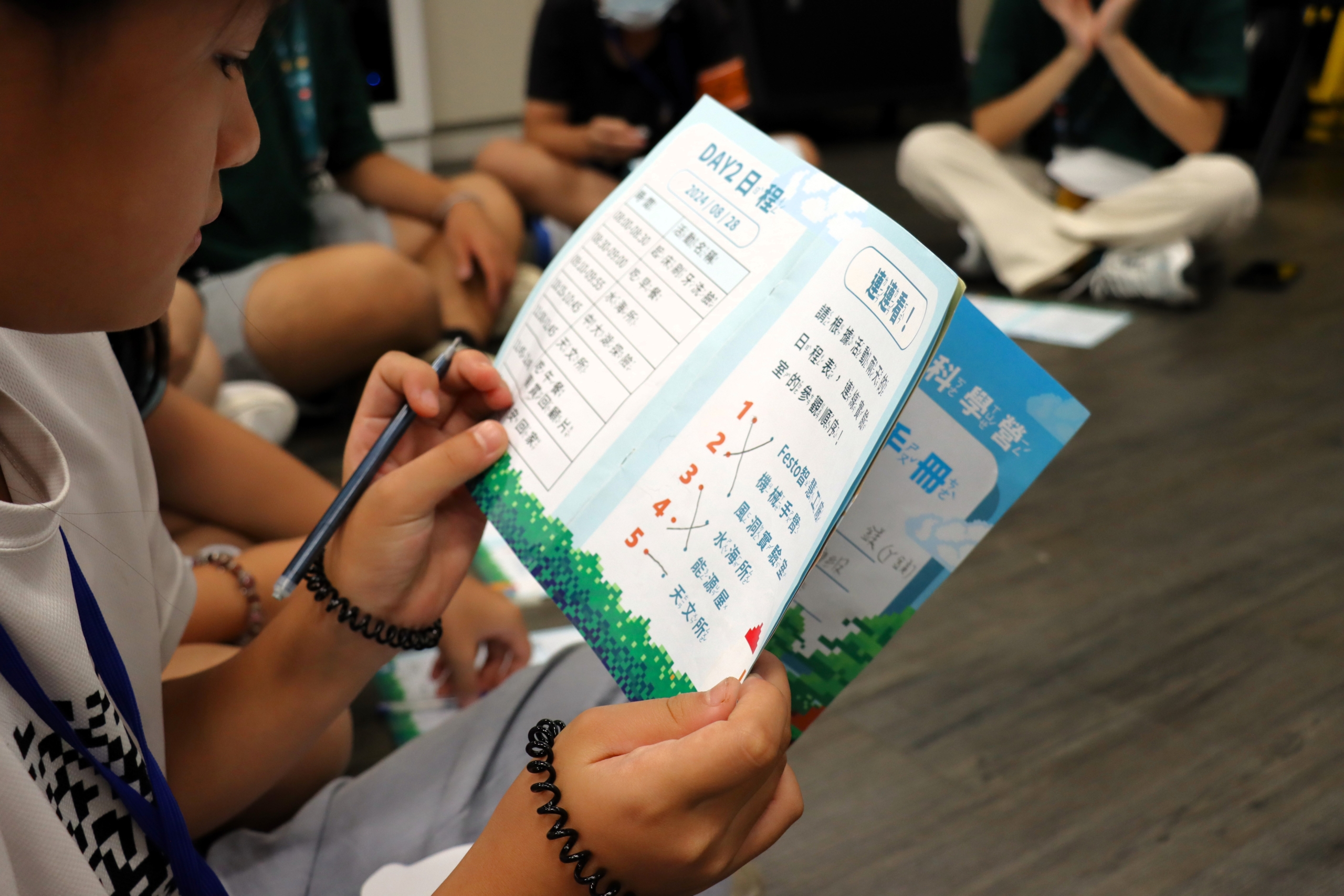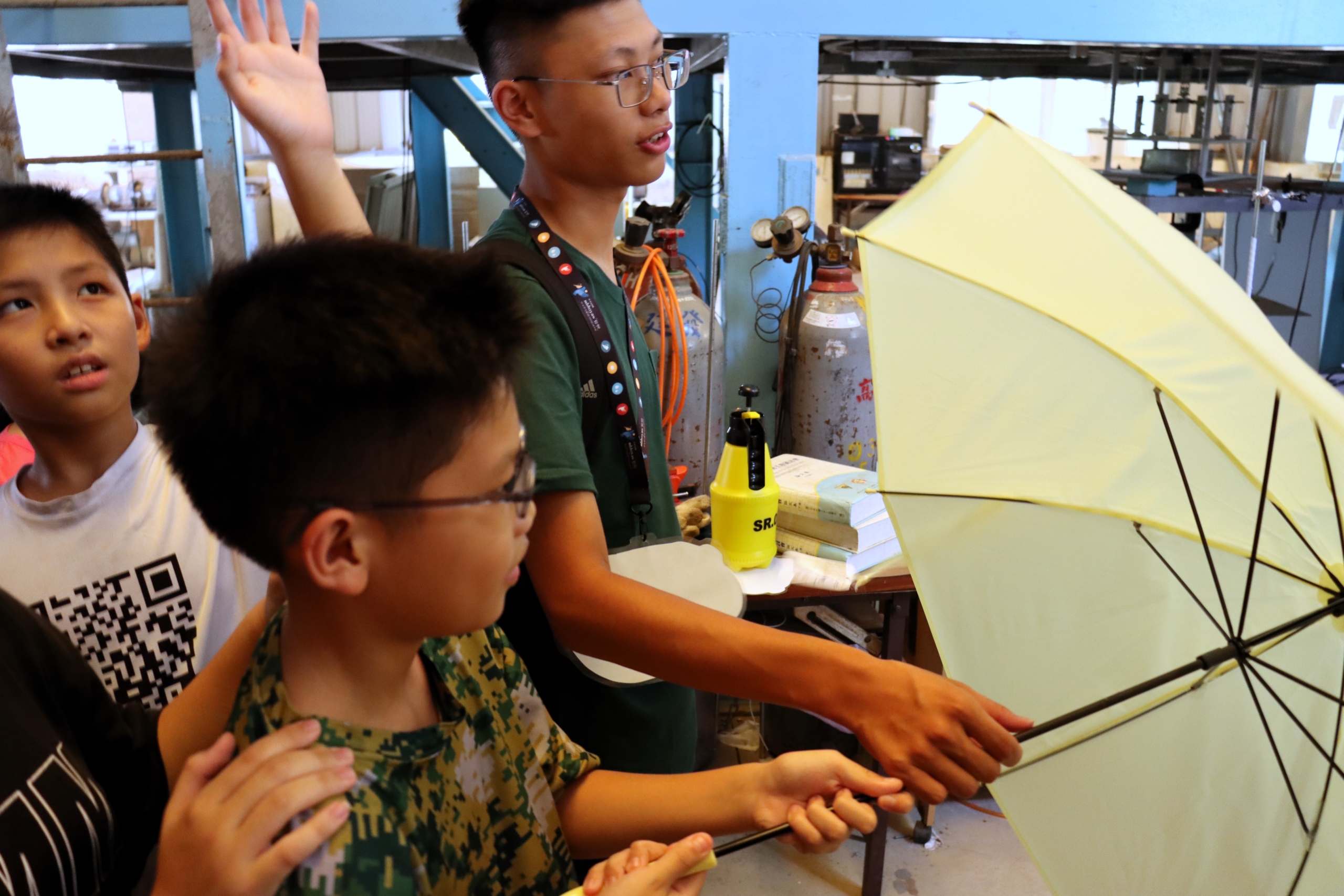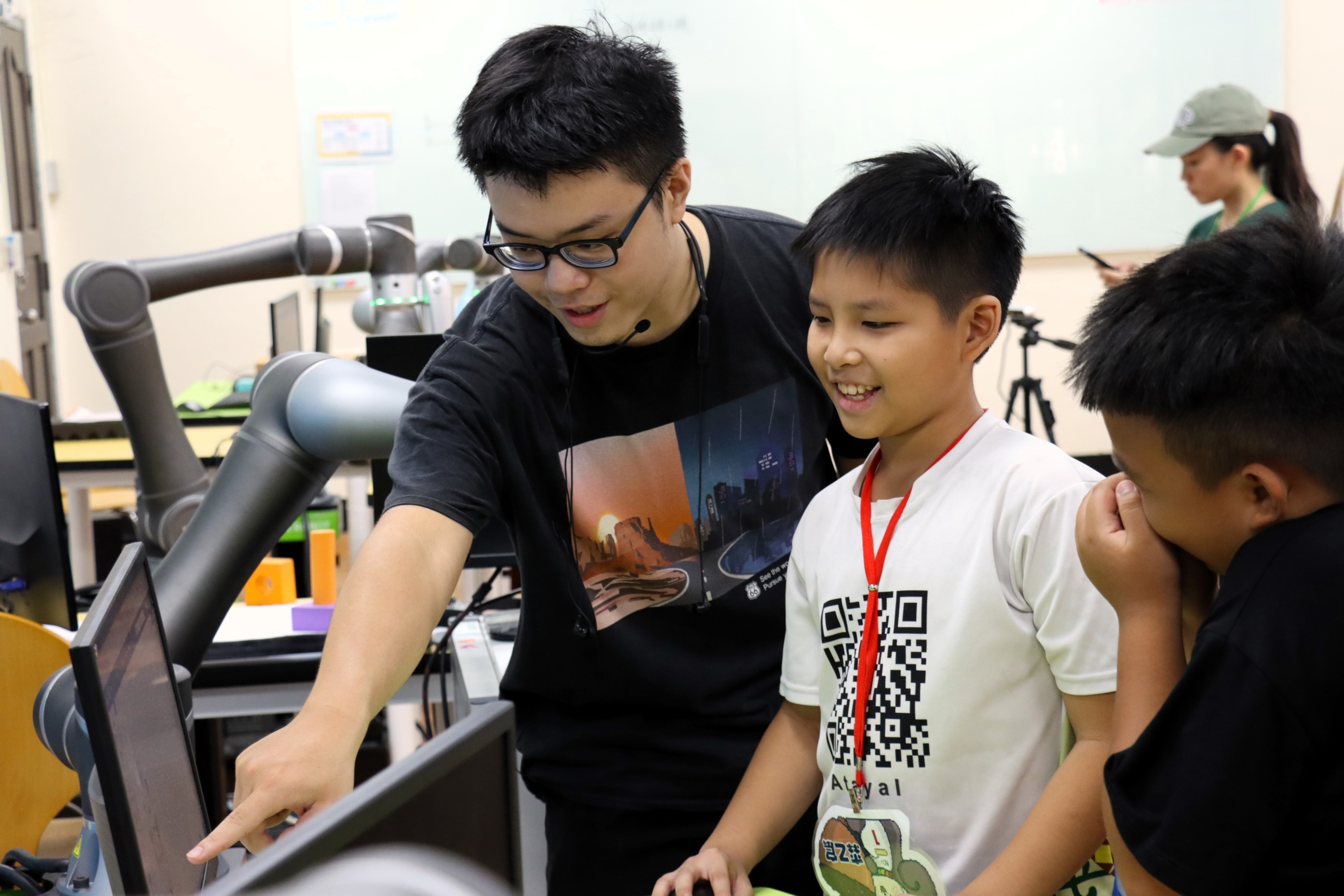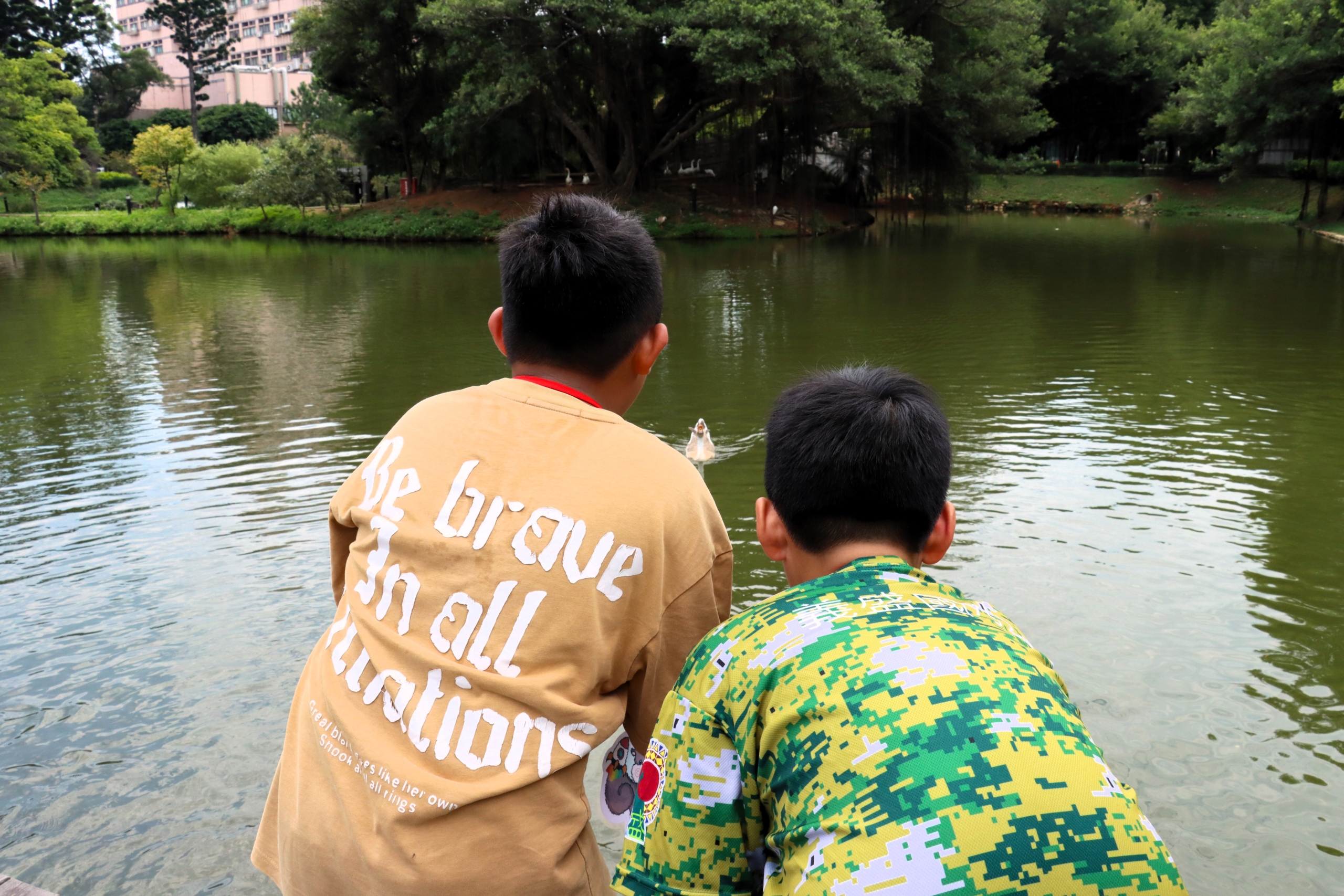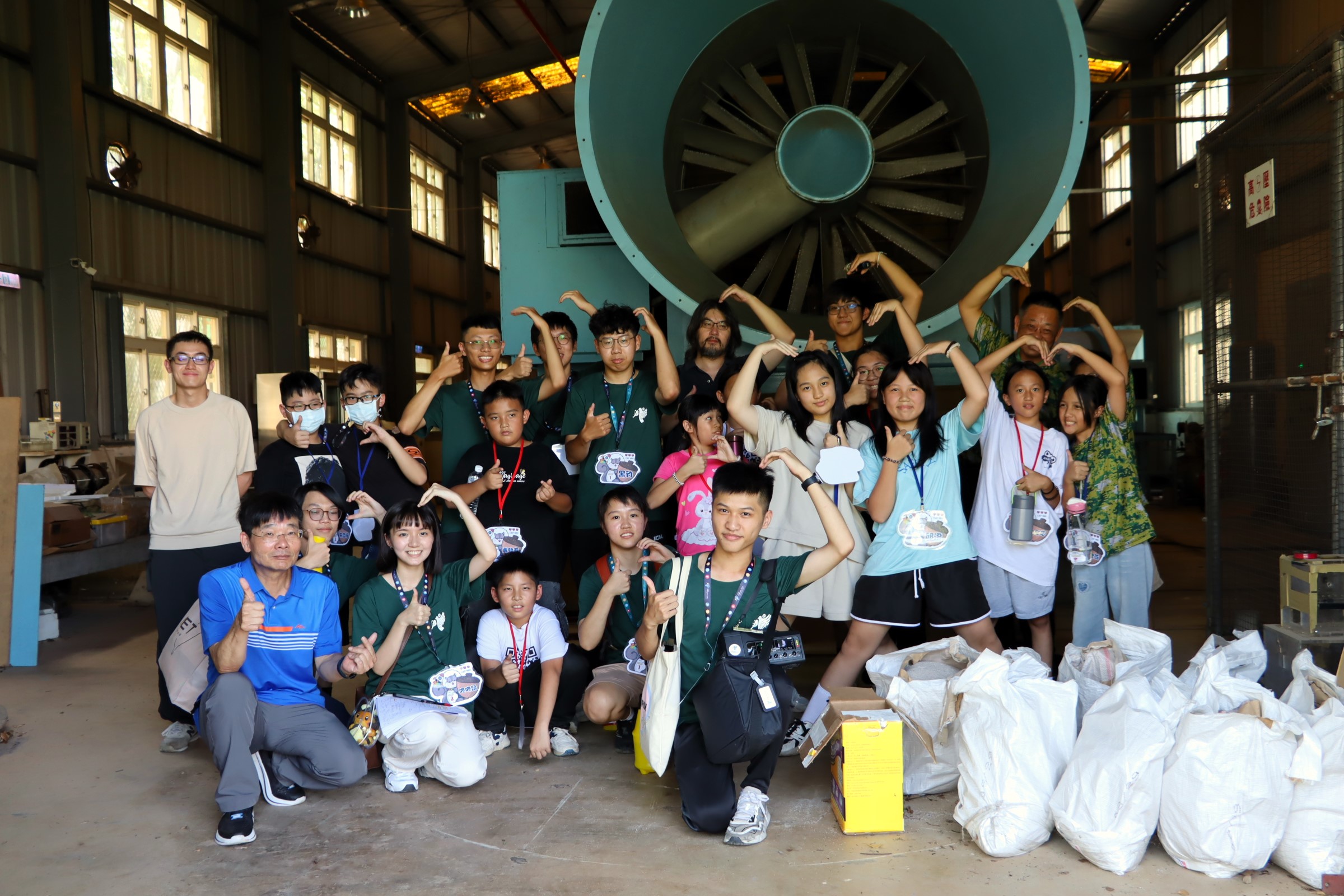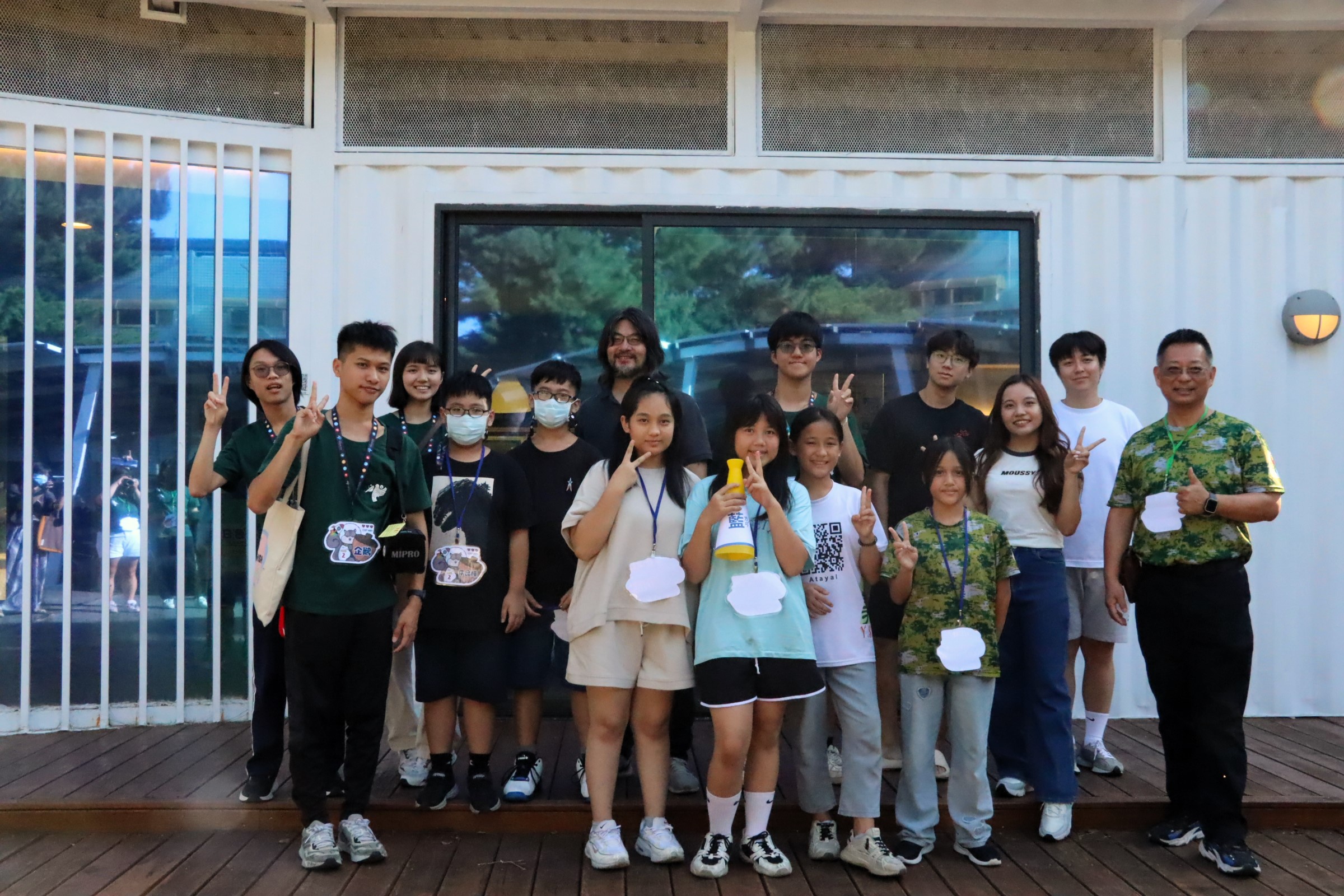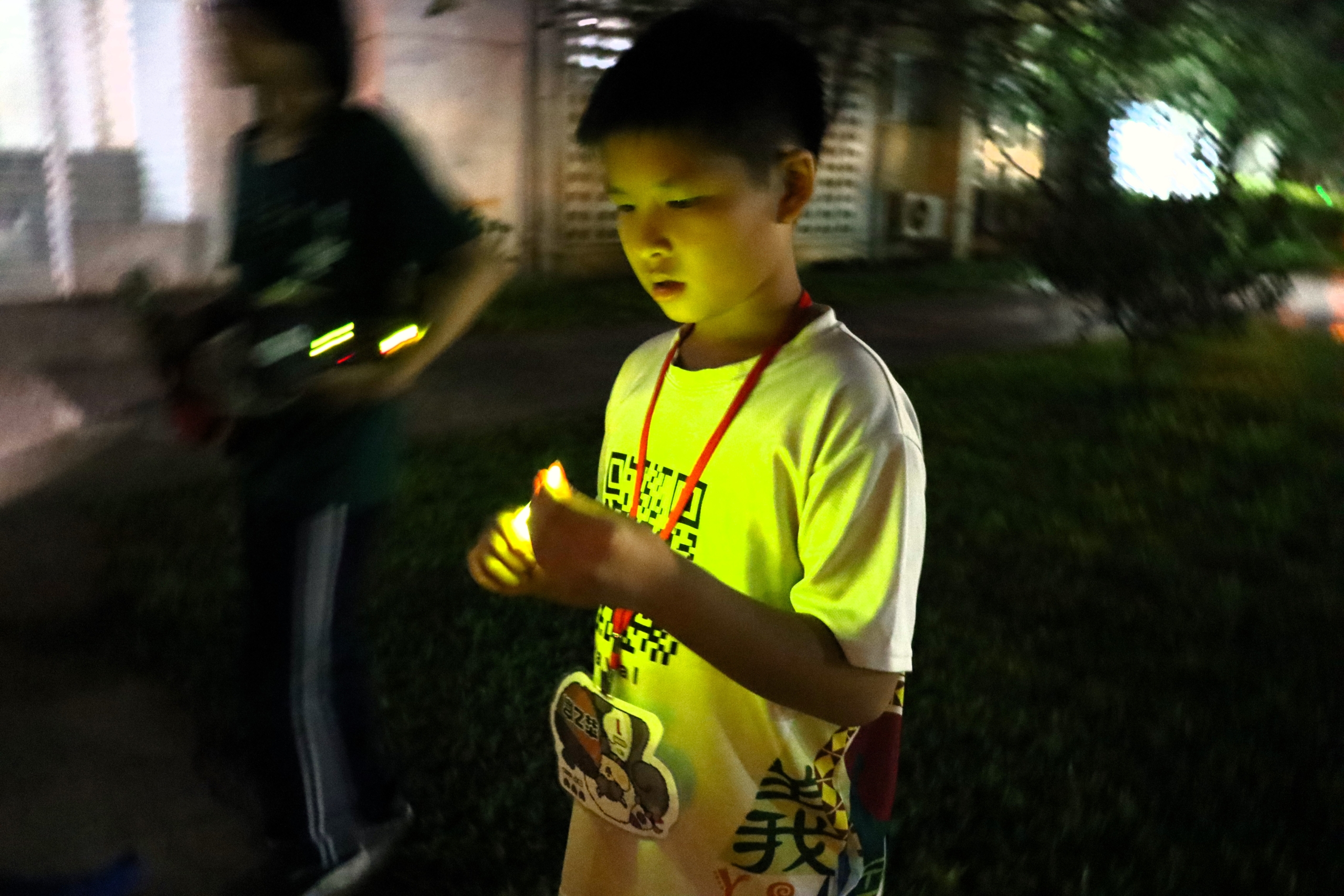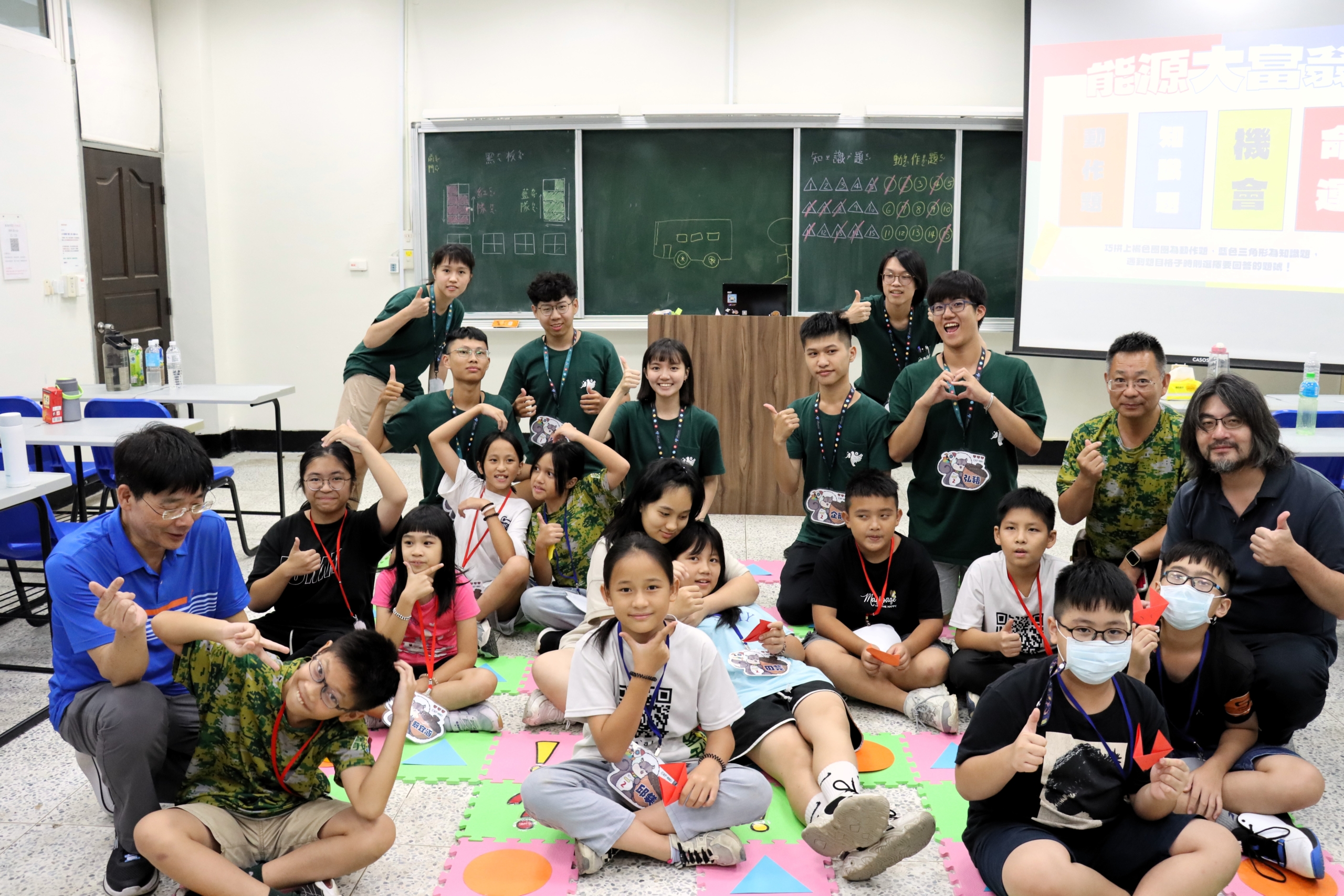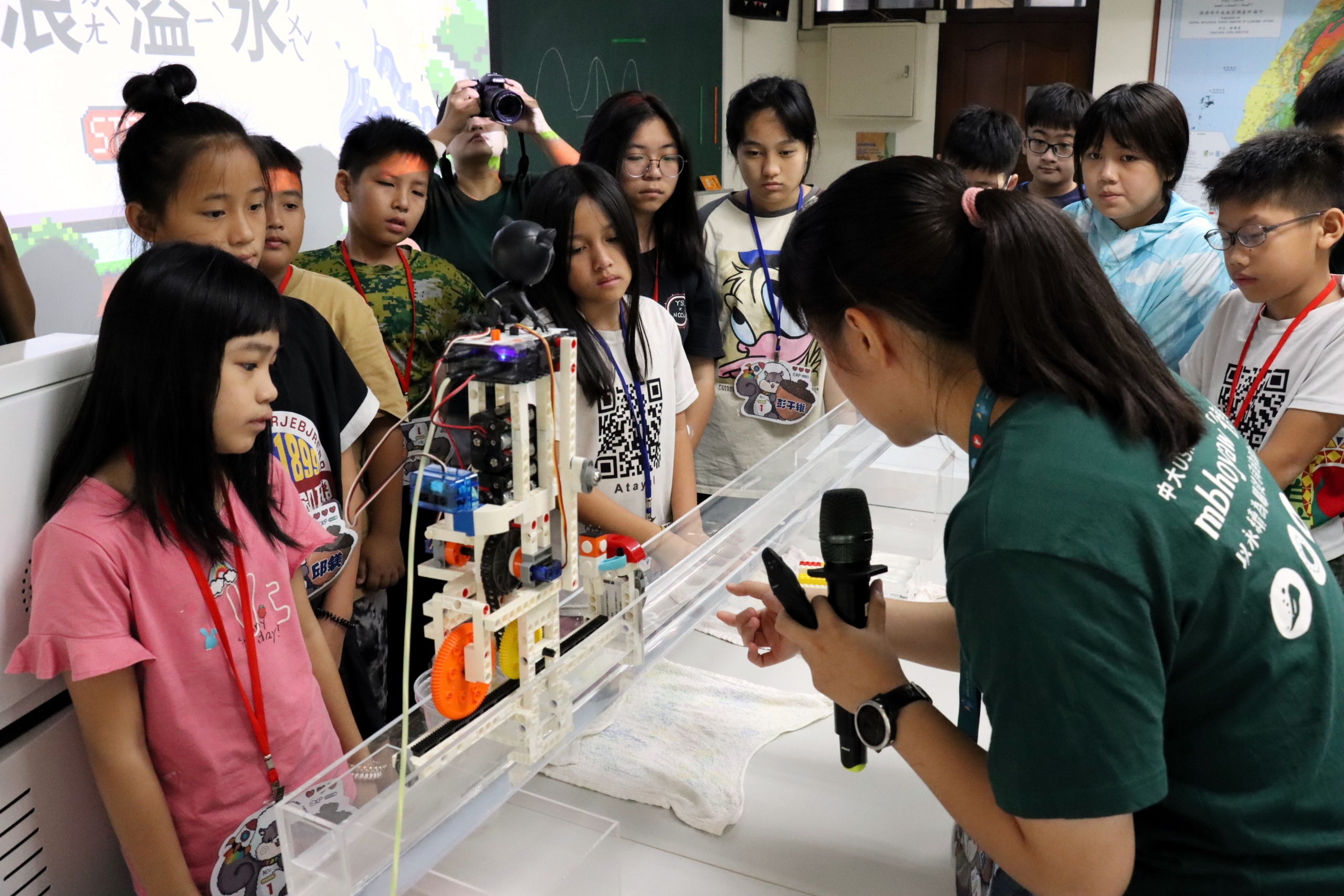The two-day, one-night learning exchange camp hosted by National Central University kicked off at Yisheng Elementary School at the end of summer. This was the first school I interacted with during my community co-learning experience, and through my camera lens, I was able to reconnect the vague memories of the past with concrete names. During the ice-breaking games, NCU students and Yisheng Elementary students interacted enthusiastically, sharing their summer activities and showing interest in each other’s daily lives. The event also provided well-designed adventure manuals, using “pinecone coins” as game rewards, symbolizing the upcoming activities as adventures that required teamwork to complete.
The camp began with experiments in the wind tunnel laboratory, demonstrating how bridges withstand waves, the concentration effect of wind in enclosed spaces, and the wind resistance of road signs during typhoons. In the “Guess Wind Speed with an Umbrella” segment, NCU students and Yisheng Elementary students collaborated to discuss how to accurately estimate wind speed. In the “Newspaper Wind Resistance” challenge, students cut newspapers and used tape to design structures that could withstand wind and water forces. The room was filled with laughter and active participation.
During the experience at the Festo Smart Factory, students learned to operate robotic arms and played the “Origami Assembly Line” game, which simplified complex mechanical operations into easy-to-understand teaching scenarios. The students worked together to arrange their tasks; despite minor mistakes, they successfully completed the challenge through communication. Later, during the visit to the Energy House, Yisheng Elementary students demonstrated great focus as they listened attentively to the introduction of solar facilities and eco-friendly building materials. Notably, one student recognized a NCU student who had previously taught at their school, making for a touching moment that showcased the profound connection between knowledge and life.
In the robotic arm collaboration experience, students operated robotic arms in groups, completing tasks to pick up blocks by writing programs and manually positioning the arms. From initial shyness to later enthusiastic participation, the Yisheng Elementary students gradually immersed themselves in the activities, with NCU students patiently guiding them and offering warm encouragement. The subsequent “Energy Monopoly” game integrated the knowledge learned throughout the day, perfectly concluding the activities. In the evening, the astronomy classroom introduced the stars and star map software, using stories of the Big Dipper, Vega, and Altair to spark the students’ anticipation for stargazing activities. Under the stars in the grass pavilion, students with telescopes and glow sticks chased after the twinkling points in the sky, sharing a wonderful night with the NCU students.
On the second day, we conducted the “Wave Making” activity at the Water Research Institute, where students experienced using a wave maker, turning knowledge into practical application. Then, around NCU Lake, we introduced the campus’s ecological environment, highlighting the fish in the lake, the “notorious” geese, and the mouse holes discovered by the students, all becoming points of laughter. The camp’s final stop was the Astronomy Institute, where students learned to operate telescopes and understand solar sources. This two-day camp was rich and diverse, showcasing the mutual support and trust between NCU and Yisheng Elementary students. I believe our next meeting will bring another exciting adventure.
Text by Yu, Kang-Chi
Edited by Li, Ruo-Jia
Photos by Yu, Kang-Chi
Participating in this small reporter activity was a completely new experience for me. Although it wasn’t held in the mountains, I explored many unfamiliar buildings on the NCU campus with the children, almost like being part of a mini camp. Visiting the Civil Engineering Department’s wind tunnel laboratory and the Mechanical Engineering Department’s Da Vinci arm facilities left me amazed and excited. Accessing these normally restricted spaces added a unique touch to the event. The vitality and curiosity of the children, especially the students from Yisheng Elementary, who were clever and well-behaved, deeply impressed me. Their interest in each segment was evident, and nobody complained of fatigue, which made me feel the activity was a great success and filled my heart with satisfaction.
Among the many activities, the stargazing event at night left the most lasting impression. This was my first time visiting the observatory. Such opportunities are rare even for many students who have spent years at NCU. The deep bond between the principal and the teachers was touching, and the close-knit interactions among the elementary school teachers and students resembled a familial relationship, allowing me to reconsider another dimension of teacher-student bonds.
At the end of the event, the teaching assistants meticulously edited thousands of photos taken over the two days into a highlight video. When I saw those images, it felt like I was reliving every moment I had experienced with the children. Although I have taken many photos in the past, I had never compiled them into a video. This recap video moved me deeply and provided me with a new perspective on event photography.
This activity was not only a challenge but also a journey filled with emotions and memories. Through interactions with the children, I gained valuable experiences and growth, and these memories will become an important part of my life.
Text By Hsiao, Yong-Jen
Edited by Li, Ruo-Jia
Photos by Hsiao, Yong-Jen
The “Little NCU” camp means more to me than just “leading children to explore National Central University.” It embodies the experience of allowing each participating elementary school student to briefly feel what it’s like to be a student at NCU, discovering the “fun” within that life. The children in the camp were divided into red and blue teams, each with six energetic and unique kids. The red team was relatively outgoing and lively, while the blue team displayed stronger concentration.
In terms of the itinerary, I was most engaged with the Energy House and the Energy Monopoly game, as well as the stargazing activity at night. During the Energy House explanation, I noticed the children were very curious about the professional knowledge being presented. Although they might not fully grasp the deeper meanings behind the explanations, they were able to remember the main points. Subsequently, they participated in the Energy Monopoly game, utilizing the knowledge they had learned, such as reasonable energy use and reducing carbon footprints, posing creative questions and engaging in discussions. I felt their immersion and involvement in the “Little, Middle, Big” experience. The stargazing event was one of the highlights of the camp. The star guide used STELLARIUM to project virtual star tracks in the classroom, telling stories about constellations, which created a dynamic atmosphere during the camp. Compared to the experimental content or the simplified explanations from graduate students, I found that constellation stories were simpler and more charming, directly capturing the children’s attention and focus. This educational approach was more aligned with the characteristics of children. We led the children to lie on the lawn, gazing at the night sky, using telescopes to observe constellations and creating their own works with glow sticks in the dark. As I watched them intently observing the stars, I suddenly felt that this event was incredibly valuable.
What impressed me most during the “Little, Middle, Big” camp was the realization that “plans are not as good as changes.” For example, discovering that the wave-making machine at the Water Research Institute was not functioning properly during a pre-test or encountering a projection screen malfunction tested the team’s adaptability and cooperation. Fortunately, having this experience and the procedural documents should help us avoid the challenges faced during the initial phases of future activities. The overall experience of the camp not only allowed me to learn and grow through helping others, but it also deepened my understanding of the importance of teamwork and careful planning. Seeing the children gain knowledge and joy from the activities brought me immense satisfaction. This experience has also inspired me to participate in more educational activities in the future, contributing to the growth and learning of more children.
Text By Zhou, Yan-Rui
Edited by Li, Ruo-Jia
Photos by Yu, Kang-Chi

